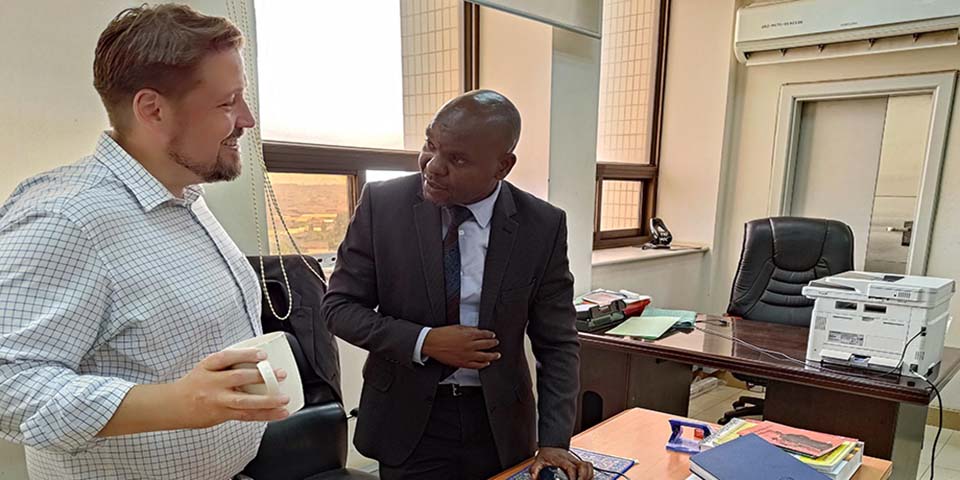“Enhanced trade helps to reduce poverty in the country”

Anders Karlsson and Trust Mufune work with technical barriers to trade at the Ministry of Commerce, Trade and Industry in Zambia.
In cooperation with the National Board of Trade Sweden, Zambia is aiming to strengthen its capacities within technical barriers to trade. Trust Mufune, Chief Economist at the Ministry of Commerce, Trade and Industry in Zambia, believes this could help to reduce poverty in the country.
What challenges is Zambia facing when it comes to trade?
Many of the challenges are in specific areas; one being maize. Trade in maize used to be subject to export bans, which affected the certainty of trade in that commodity. Furthermore, the bans pushed out commercial farmers, who stopped growing the crop. The new government has removed these bans, which means the outlook is good now. We may see commercial farmers coming back, which could increase Zambia’s production of the commodity.
We also experience technical barriers to trade when we trade with some of our neighbouring countries. There is also a lot that needs to be done when it comes to trade and trade infrastructure. We are currently working a lot with trade facilitation and the efficient movement of persons and goods at the borders by streamlining border procedures. For instance, there is a drive to upgrade border infrastructure to ensure vehicles stop only on one side of the border to finalise all the paperwork as opposed to stopping on both sides. This will reduce the time taken to cross the border.
With regard to trade, these are the main issues that I would point out for now.
What support does your country receive from the National Board of Trade?
I would say that the support varies. It ranges from technical support to capacity building. We have been attending the National Board of Trade’s training on trade policy and many of our colleagues have been upskilled in this area.
In Zambia, we have the Technical Barriers to Trade (TBT) Committee that deals with notifications from WTO regarding technical barriers to trade. The National Board of Trade has attached a technical expert who has been helping us to build staff capacity and giving us advice on how to proceed with that committee. He has been very instrumental in setting up the Technical Regulations Department. He is also helping us to set up the Zambia Accreditation Body as part of the process of enhancing the quality infrastructure in Zambia.
What do you hope to achieve from this cooperation?
This cooperation is building skills in the area of trade in the Ministry of Commerce and in Zambia as a whole. Going forward, I think we will benefit as a country in terms of enhanced trade. Because if you have staff that understand trade, ultimately that translates into having sound policies on trade and any other issues that affect trade. So ultimately, we expect to have well-thought-out policies and generally also to be able to guide industry in how to conduct the business of trade as well. We are civil servants, and we advise politicians. With a good knowledge base, you are bound to give sound advice, which eventually helps to enhance trade and ultimately reduce poverty in the country.
I would say that it’s important that this cooperation continues so that more and more skills can be built. And as far as sustainability is concerned, it would help to bring on board higher education institutions in Zambia, in both the private and public sector. If they can come on board and have their trade courses aligned to the practical aspects of the industry, as well as develop lecturers’ skills, I believe that would help to sustain enhanced trade and sound policies on trade and industrial matters.
